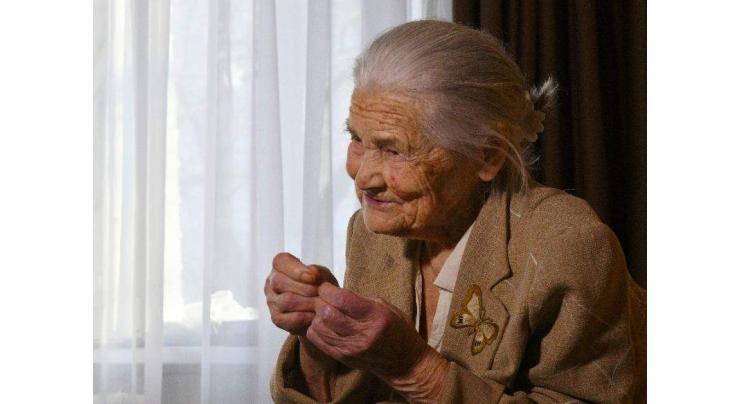
Aged 97, Survivor Looks Back On Stalin-era Ukraine Famine
Faizan Hashmi Published November 23, 2018 | 12:32 PM

Oksana Ostapenko was 12 years old and facing death from hunger when a stranger saved her life by taking the girl into his family and sharing the last of their food.
Kiev, (APP - UrduPoint / Pakistan Point News - 23rd Nov, 2018 ) :Oksana Ostapenko was 12 years old and facing death from hunger when a stranger saved her life by taking the girl into his family and sharing the last of their food.
Today, aged 97, the Ukrainian's voice trembles when she recalls the terrible famine that hit her country in the 1930s due to policies enforced by Joseph Stalin's police.
"They came and took away all our grain," Ostapenko told AFP.
Officers also took away her father, who was sentenced to five years in a northern Russian prison camp because he was a landowner.
Ostapenko's mother was left to raise five children as authorities confiscated supplies to meet centralised targets.
Her mother saw no option but to send Ostapenko to live with a family in a village near their native Kozliv, some 60 kilometres (40 miles) southeast of Kiev.
They hoped that the daughter would return once the famine was over.
But weeks after the girl left, her mother and youngest brother died of starvation.
Her mother "came to see how I was... then returned to her village, and later I was told she had passed away," Ostapenko remembers as she sits in the Kiev flat she now shares with own daughter.
- 'Genocide' - The death toll of the famine -- known as the "Holodomor" in Ukrainian -- remains debated among historians. But Kiev authorities estimate the number of those who died at around four million, or 13 percent of the total population at the time.
Kiev has recognised this as a genocide against the Ukrainian people by Stalin's regime, specifically aimed at eradicating the country's peasantry. More than 15 countries recognise that view of events.
Now dozens of stories like Ostapenko's have been gathered in a book published to coincide with the 85th anniversary of the Holodomor.
The national day of remembrance of the famine is on Saturday.
The book, "Humanity in an Inhumane Time", focuses on the people who saved others from dying of hunger.
It brings together testimonies from teachers, collective farm chairmen and ordinary villages who used sparse resources to help others survive.
- Jailed for feeding children - Ostapenko's saviour was Yegor Kryvenko, whose work as a mechanic at a local mill allowed him to secure some extra flour for his family.
"I just met kind people," Ostapenko said of the father-of-two who offered to take her in when her own mother could no longer support her.
"He divided everything that was stored equally, down to the last gramme," she said.
"It has to be shared," she recalled Kryvenko saying as he divided up a few dozen small potatoes between her and his own children. This would be almost all the food they would see for several weeks.
"And when the (requisitioned) grain was being loaded onto the wagons, it would scatter and I'd go pick it up to bring it home," she said.
"There were very difficult years. Let them no longer return to our people." Volodymyr Tylischak, one of the authors of the book to mark the anniversary, said many of those who helped others were sentenced to long jail terms.
Some of them dared to gather crops and hand them out to peasants, while others secretly organised meals for children in schools.
"Even in the most dire conditions there were those who had the courage to resist," Tylischak said.
"They saved lives. One, several or the whole community -- depending on what opportunities they had," said Viktoriya Yaremenko, a historian who also worked on the book.
"Each story is a feat, and you understand that only after immersing yourself in those terrible years."
Recent Stories

Mired in crisis, Boeing reports another loss

Session Awarding Ceremony 2024 held at Cadet College Muzaffarabad

Austrian ski great Hirscher to make comeback under Dutch flag

Pakistan, Japan agrees to convene 'Economic Policy Dialogue'

FM Dar conveys deepest sympathy on torrential rains devastation in UAE

Spain PM Sanchez says weighing resignation after wife's graft probe

Tennis: ATP/WTA Madrid Open results - 1st update

Long-lost Klimt portrait auctioned off for 30 mn euros

Osaka seals first win on clay since 2022 in Madrid

Earthquake jolts Karachi

Sindh minister orders operation after attack on police in Ghotki

TikTok to fight US ban law in courts
More Stories From World
-
Football: English Championship table
2 hours ago -
Time for 'democratic transition' in Venezuela: opposition candidate to AFP
3 hours ago -
Spain's Pedro Sanchez : a risk-taker with a flair for survival
3 hours ago -
Football: French Ligue 1 table
3 hours ago -
Nadal will only play French Open if he can 'compete well'
3 hours ago -
Ukraine, Israel, TikTok: the massive aid package before US Congress
3 hours ago
-
TikTok to fight US ban law in courts
3 hours ago -
Football: French Ligue 1 results
4 hours ago -

Spain PM Sanchez says weighing resignation after wife's graft probe
5 hours ago -

Long-lost Klimt portrait auctioned off for 30 mn euros
5 hours ago -

TikTok to fight US ban law in courts
5 hours ago -

Anger among Ukrainians in Poland as Kyiv halts passport renewals
5 hours ago



